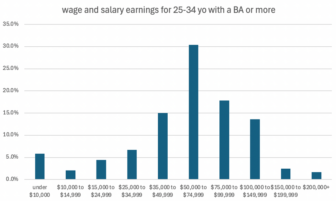Bloomberg Businessweek just published their New Rules for the modern workplace. Their list:
Rule No. 1: Your job is temporary. Where you start isn’t where you’ll end up. Your job, company, and profession may completely change because of mergers and acquisitions, layoffs, outsourcing, automation, and various other factors that are outside your control.
Rule No. 2: Do not let your job description confine you. … While you’re managing your role, you should be acquiring new skills to help carry you to your next role.
Rule No. 3: Your Rolodex is more important than your knowledge base. We’ve moved from the information economy to the social economy. Companies are hiring based on cultural fit, connections, and soft skills over a candidate’s ability to get the job done.
Rule No. 4: Your experiences matter more than your title.
Rule No. 5: Your personal reputation is your greatest asset.
Add these to the non job specific attributes that we have explored in previous posts that employers are increasingly looking for and that will most define who has successful careers in the future. And then ask yourself whether policy makers in emphasizing standardized test results, job specific skills and online learning are moving k-16 education towards or away from the economy of the future.
Harvard’s Tony Wagner in his interview with Thomas Friedman I wrote about in my last post clearly thinks the answer is no. Friedman writes:
“We teach and test things most students have no interest in and will never need, and facts that they can Google and will forget as soon as the test is over,” said Wagner. … More than a century ago, we ‘reinvented’ the one-room schoolhouse and created factory schools for the industrial economy. Reimagining schools for the 21st-century must be our highest priority. We need to focus more on teaching the skill and will to learn and to make a difference and bring the three most powerful ingredients of intrinsic motivation into the classroom: play, passion and purpose.” (Emphasis added.)
… “Teachers,” he said, “need to coach students to performance excellence, and principals must be instructional leaders who create the culture of collaboration required to innovate. But what gets tested is what gets taught, and so we need ‘Accountability 2.0.’ All students should have digital portfolios to show evidence of mastery of skills like critical thinking and communication, which they build up right through K-12 and postsecondary. Selective use of high-quality tests, like the College and Work Readiness Assessment, is important. Finally, teachers should be judged on evidence of improvement in students’ work through the year — instead of a score on a bubble test in May. We need lab schools where students earn a high school diploma by completing a series of skill-based ‘merit badges’ in things like entrepreneurship. And schools of education where all new teachers have ‘residencies’ with master teachers and performance standards — not content standards — must become the new normal throughout the system.”
Jack Lessenberry in a Michigan Radio commentary entitled Education for education’s sake also would answer no. (In the column Lessenberry is critical of remarks made by State Superintendent Mike Flanagan. Mike –– a terrific member of the Michigan Future Leadership Council –– responds in a podcast that you can find here. I know they both agree that we need an education system that provides all students with broad, rather than narrow job specific, skills building.)
Lessenberry says:
There’s nothing wrong with education for education’s sake—if that means teaching people how to think, and how to learn. There is also nothing wrong with knowing lots of things that are part of culture and civilization, even if they aren’t knowledge that can immediately be converted into cash. The schools cannot possibly teach students how to cope with the technology or the tax structure that they’ll need to know in the year 2035, because we have no idea what that technology will be.
The woman with whom I share my life spends her days digitizing archives and designing and creating online catalogs for special library collections. These are not things she learned in high school or college, because the technology hadn’t been invented, and partly because she hadn’t developed an interest in that field. Instead, she studied languages and comparative literature. She didn’t learn how to do modern computer coding till she was in her 50s. I didn’t study journalism until graduate school. But I studied other things that equipped my mind with a set of intellectual furniture and the tools to try to keep learning and figuring stuff out.
… whenever I hear people say that education should be geared to the needs of a particular set of employers or a specific job, I think of Aldous Huxley’s nightmare novel, “Brave New World,” where humans were rigorously selected for certain tasks before birth, and the lower orders kept dumb and ignorant.
… Doug Rothwell, the CEO of Business Leaders for Michigan does understand what education is, and said so yesterday. “We need people with the skills to adapt to changes in their careers,” he said, adding, “A lot of that comes from a good liberal arts education.” From where I sit, I couldn’t agree more.
Our policy makers have a lot to learn from folks like Wagner, Lessenberry, Rothwell and so many others –– including most importantly many employers –– who understand that it is broad skills –– many not cognitive or job specific –– that matter most to success in the economy of the future. Until they learn those lessons we are in real danger of preparing our children and grandchildren for an economy that no longer exists with a huge cost to both them and our economy. Not smart!






